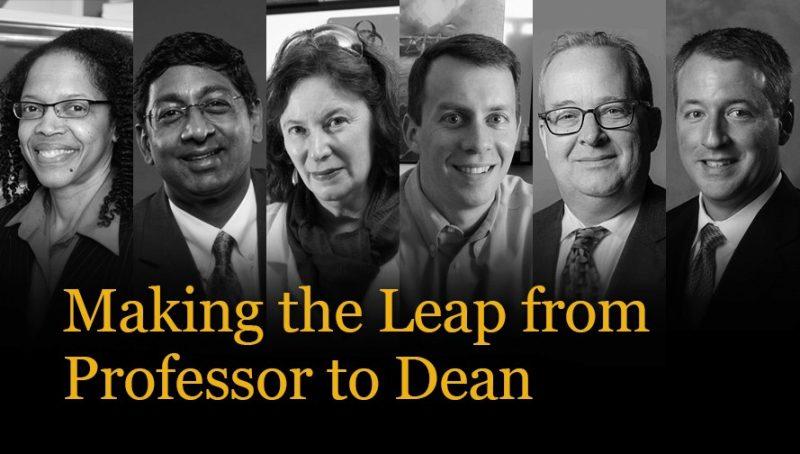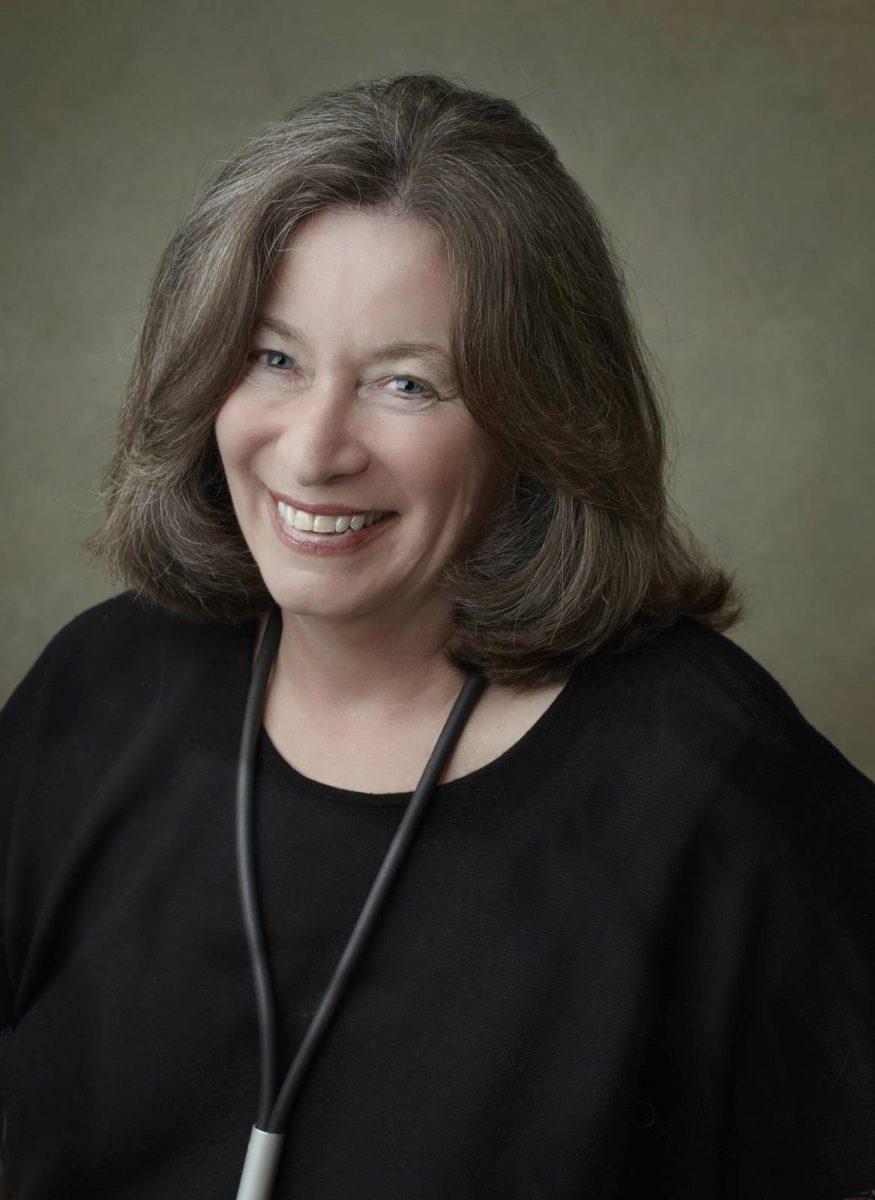Former CoE faculty members who took dean roles elsewhere reflect on Georgia Tech.

As seen in the Spring 2017 issue of the Georgia Tech Engineers Magazine.
Supportive colleagues. Interdisciplinary research. Valuable mentorship opportunities.
These are just a few of the reasons listed by former College of Engineering professors about what makes CoE a great place to work. Over the past few years, those former faculty members have all accepted dean roles at other universities, demonstrating that the College also offers an excellent foundation for leadership.
“I truly appreciate the commitment that Georgia Tech has to undergraduate learning and to innovation in engineering education,” says Steve DeWeerth, now dean of the P.C. Rossin College of Engineering and Applied Science at Lehigh University. While at Georgia Tech, he held posts including associate chair for graduate studies in the Coulter Department of Biomedical Engineering and associate dean for research and innovation.
Tech’s focus on interdisciplinary research and innovation shaped DeWeerth’s vision for Lehigh. One of his first orders of business there was to initiate an “envisioning process” for his college. This faculty-led advancement of Lehigh engineering focuses on enhancing research impact and interdisciplinary endeavors.
DeWeerth says what when the Lehigh job opened, he knew it was the right time to move. But there are still things he misses about Georgia Tech.
“People are really committed to the university,” he says. “Georgia Tech is such a wonderful place that way.”
The Institute is committed to them in turn. Faculty members have plenty of chances to tackle new challenges, which Ravi Bellamkonda (now dean of engineering at Duke University) named as key to his career growth.
“Georgia Tech is a dynamic, can-do place and is very permissive to those who want to engage and lead,” says Bellamkonda, who left Tech when he was chair of the Coulter Department. “As a result, I had many experiences at Georgia Tech that allowed me to discover and develop my ability to have impact beyond my department. GT/Emory BME and IBB faculty, staff and students are very special.”
Perhaps it might seem natural, then, that mentorship is also important at Georgia Tech. Bellamkonda can name plenty of fellow faculty members and administrators who influenced his career, including Bob Nerem of the Petit Institute for Bioengineering and Bioscience, Georgia Tech Executive Vice President for Research Steve Cross, and Bill Todd of the Scheller College of Business.
“It is also special and unusual to have Provost Rafael Bras and President Bud Peterson be so accessible and willing to give their time freely,” Bellamkonda says.
As Gary May, the outgoing dean of the College of Engineering, prepares for a new role himself as chancellor of the University of California, Davis, several former CoE faculty members also cite the value of his leadership in inspiring their own paths to dean roles.
“I have been lucky to have been able to assemble an outstanding leadership team,” says Barbara Boyan, who became dean of engineering at Virginia Commonwealth University in 2013. “Watching [former CoE Dean] Don Giddens and Gary May as role models, I learned to trust my team.”
Boyan (left) spent over a decade at CoE, and she ended her tenure there as associate dean for research and innovation. While at Georgia Tech, she helped spearhead the Institute’s relationship with Children’s Healthcare of Atlanta, and she directed the Translational Research Institute for Bioengineering and Science (which led to the creation of the master’s program in biomedical innovation and development).
“The leadership team empowers faculty and staff at all levels to be the best that they can be,” she says.
That fact might make it difficult to leave Georgia Tech at all, but new opportunities always beckon. Bobby Braun, who was a professor in the School of Aerospace Engineering until 2016 (and spent a year as NASA’s chief technologist), saw a dean role at the University of Colorado Boulder as a chance to “integrate the leadership and management skills I developed at NASA with the academic and scholarship experiences I had matured at Tech.”
Like other faculty members, Braun highlights the influence his colleagues had on his career. He names Ben Zinn, David S. Lewis Jr. Chair in Aerospace Engineering, and AE Chair Vigor Yang as two of his foremost mentors.
“I certainly learned the significance of interdisciplinary research at Georgia Tech,” Braun says. “Just as significant, I learned the importance of true scholarship, collegiality, personal respect, and the need for open and consistent communication.”
Sometimes, taking a position as dean can give a faculty member the chance to build on an emerging legacy. Gilda Barabino served as Georgia Tech’s first vice provost for academic diversity (in addition to the Coulter Department’s associate chair for graduate studies). Now that she is a dean, Barabino says, she continues her work opening doors to more diverse students.
“My position as dean of The Grove School of Engineering at The City College of New York affords me the opportunity to lead one of the most diverse engineering schools in the nation,” she says. “CCNY’s historic mission of access to excellence appealed to me and my desire to ensure that the talent pool for engineering is fully tapped and that a diverse cadre of engineers are trained to creatively solve societal problems.”
Her interdisciplinary collaborations at Tech, as well as the administrative posts she held, help guide her as dean.
“Opportunities for leadership and professional development are critical to the advancement of faculty and to the advancement of the institution,” she notes.
Joseph Hughes, who spent nine years at CoE, can speak with a unique authority about how the lessons of Georgia Tech translate to dean roles. He recently stepped down as Drexel University’s dean of engineering.
“My job as dean at Drexel was a dream come true,” he says. “Challenging. Rewarding. Frustrating. Exciting. New, every day.”
While at Georgia Tech, he served as Karen and John Huff Chair of the School of Civil and Environmental Engineering, (and briefly the Tellepsen Family Chair of Engineering). He appreciated the respect and freedom granted to Tech faculty members – as well as the sense of accountability.
Those qualities extended beyond faculty members, he notes. At Drexel, he thought back on two particular Georgia Tech mentors who embraced some of the Institute’s best qualities.
“Whenever I questioned my compass as dean, I said to myself, ‘What would Don Giddens do?’ He was a remarkable dean and is a great human being,” Hughes says. “Second, I would recall something that Wayne Clough instilled in me: I had just given a great talk to the Georgia Tech board (or so I thought), and Wayne pulled me aside and said to me, ‘You never said the word student. Never do that again.’ He was not happy with me. I have never forgotten the lesson.”
